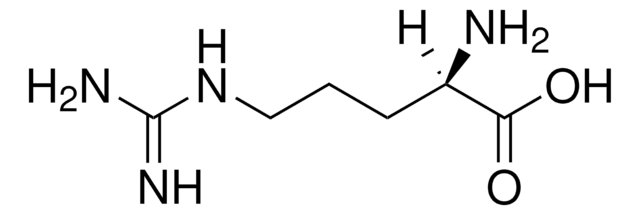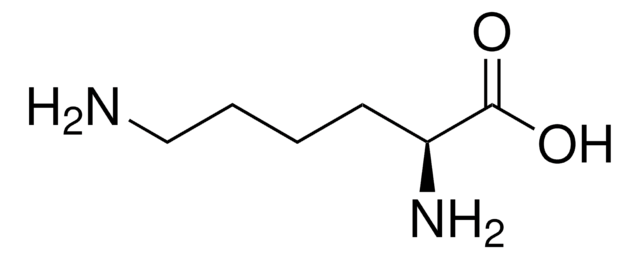A4881
DL-Arginine hydrochloride
≥98% (TLC)
Synonym(s):
Arginine hydrochloride
Sign Into View Organizational & Contract Pricing
All Photos(5)
About This Item
Empirical Formula (Hill Notation):
C6H14N4O2 · HCl
CAS Number:
Molecular Weight:
210.66
EC Number:
MDL number:
UNSPSC Code:
12352209
PubChem Substance ID:
NACRES:
NA.26
Recommended Products
Product Name
DL-Arginine hydrochloride, ≥98% (TLC)
Quality Level
Assay
≥98% (TLC)
form
powder
color
white to off-white
mp
128-130 °C
solubility
H2O: soluble
SMILES string
Cl.NC(CCCNC(N)=N)C(O)=O
InChI
1S/C6H14N4O2.ClH/c7-4(5(11)12)2-1-3-10-6(8)9;/h4H,1-3,7H2,(H,11,12)(H4,8,9,10);1H
InChI key
KWTQSFXGGICVPE-UHFFFAOYSA-N
Application
DL-Arginine hydrochloride (DL-Arg) is a racemic mixture of the natural proteinogenic amino acid L-arginine and the non-proteinogenic D-arginine. DL-Arg is used in physicochemical analysis of amino acid complexation dynamics and crystal structure formations.
Substrates
Substrate for nitric oxide synthetase; induces insulin release by a nitric oxide-dependent mechanism.
Storage Class Code
11 - Combustible Solids
WGK
WGK 3
Flash Point(F)
Not applicable
Flash Point(C)
Not applicable
Personal Protective Equipment
dust mask type N95 (US), Eyeshields, Gloves
Choose from one of the most recent versions:
Already Own This Product?
Find documentation for the products that you have recently purchased in the Document Library.
Customers Also Viewed
N T Saraswathi et al.
Acta crystallographica. Section B, Structural science, 59(Pt 5), 641-646 (2003-10-31)
The complexes of L-arginine and DL-lysine with pimelic acid are made up of singly positively charged zwitterionic amino acid cations and doubly negatively charged pimelate ions in a 2:1 ratio. In both structures, the amino acid molecules form twofold symmetric
Siddhartha Roy et al.
Acta crystallographica. Section B, Structural science, 61(Pt 1), 89-95 (2005-01-22)
The adipic acid complexes of DL-arginine and L-arginine are made up of zwitterionic, singularly positively charged arginium ions and doubly negatively charged adipate ions, with a 2:1 stoichiometry. One of the two crystallographically independent arginium ions in the L-arginine complex
Moyu Taniguchi et al.
Journal of bioscience and bioengineering, 124(4), 414-418 (2017-06-02)
Although naturally abundant amino acids are represented mainly by l-enantiomers, fermented foods are known to contain various d-amino acids. Enantiospecific profiles of food products can vary due to fermentation by bacteria, and such alterations may contribute to changes in food
Yosuke Nakano et al.
Journal of bioscience and bioengineering, 123(1), 134-138 (2016-08-21)
d-Amino acids have recently attracted much attention in various research fields including medical, clinical and food industry due to their important biological functions that differ from l-amino acid. Most chiral amino acid separation techniques require complicated derivatization procedures in order
Moyu Taniguchi et al.
Journal of bioscience and bioengineering, 130(1), 63-70 (2020-04-09)
Japanese sake production involves three processes: rice koji fermentation, seed mash fermentation, and main mash fermentation. Traditional seed mash (kimoto) production utilizes natural lactic acid produced by lactic acid bacteria for pure cultures of only sake yeast, preventing the growth
Chromatograms
application for HPLCOur team of scientists has experience in all areas of research including Life Science, Material Science, Chemical Synthesis, Chromatography, Analytical and many others.
Contact Technical Service






